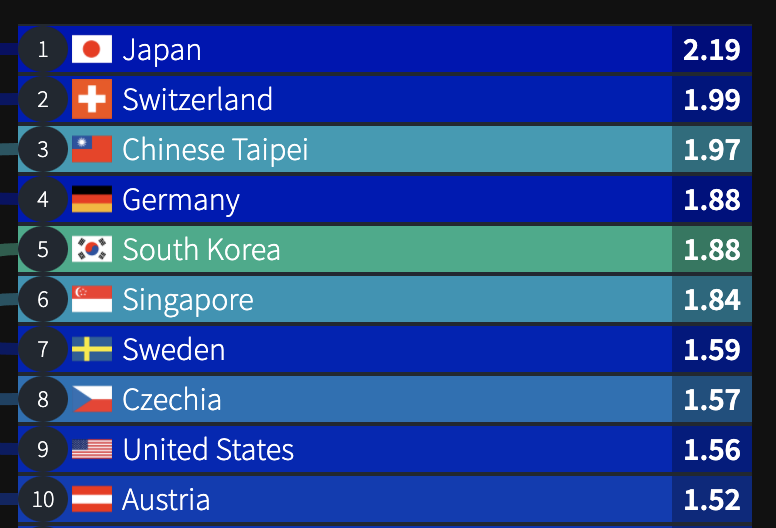
2020 Economic Complexity Index (ECI) numbers are out today!
How has economic complexity evolved during this decade?
In this thread, I discuss some key trends. /1
rankings: oec.world/en/rankings/ec…
summary: oec.world/en/blog/post/2…
#trade #development #economy #EconTwitter
How has economic complexity evolved during this decade?
In this thread, I discuss some key trends. /1
rankings: oec.world/en/rankings/ec…
summary: oec.world/en/blog/post/2…
#trade #development #economy #EconTwitter

The Economic Complexity Index has become a popular indicator of economic capacity because of its ability to explain variations in economic growth, income inequality, & emissions (for a recent academic review see nature.com/articles/s4225…).
But the world is changing. /2
But the world is changing. /2
1. The rise of East Asia
Back in the year 2000, the only East Asian economy in the top 20 of the ECI rankings was Japan. Today, 4 out of the top 6 economies are East Asian, including Japan (#1), Chinese Taipei (#3), South Korea (#5), and Singapore (#6).
Back in the year 2000, the only East Asian economy in the top 20 of the ECI rankings was Japan. Today, 4 out of the top 6 economies are East Asian, including Japan (#1), Chinese Taipei (#3), South Korea (#5), and Singapore (#6).
The rise of the latter three has been meteoric, with Chinese Taipei climbing from #22 to #2, Singapore from #21 to #6, and South Korea from #32 to #5 since the beginning of the century.
Not too far behind we have China, which climbed from #54 in the year 2000 to #28 in 2020, putting it in a similar position in terms of economic complexity than that of Chinese Taipei, South Korea, and Singapore two decades ago.
This rise is partly explained by these economies losing specialization in low-end manufacturers (such as garments) and increasing specialization in material science-intensive industries, such as chemicals and electronics.
For instance, back in the 1990s, Europe and North America amounted to about 40% of world trade in LCDs. However, by the middle of the last decade, China, South Korea, Japan, and Chinese Taipei, amounted to nearly 90% of all world trade in LCD panels. 

Beyond these well-known Asian champions, there are several other Asian countries that continue to move up the complexity rankings. For example, between 2000 and 2020, Thailand rose from #57 to #30, Malaysia from #45 to #25, and the Philippines from #69 to #39.
2. The slide of the United States & Europe
The United States & Europe led the ECI rankings during the 20th century. But during the last 20 years, the US and some (but not all) European Economies began sliding down the ECI ranking.
The United States & Europe led the ECI rankings during the 20th century. But during the last 20 years, the US and some (but not all) European Economies began sliding down the ECI ranking.
In the last 20 years the US went down from #5 to #9, the UK from #6 to #13, France from #10 to #15, & Spain from #19 to #34. Other European economies, however, have been able to stay near the top. In particular, Switzerland overtook Germany as the #2 economy in terms of ECI.
3. The diverging fates of Natural Resource-Rich countries
Natural resource-rich economies have experienced diverging fates when it comes to economic complexity.
Natural resource-rich economies have experienced diverging fates when it comes to economic complexity.
On the one hand, Saudi Arabia and the United Arab Emirates, have moved up the complexity rankings, rising respectively, from #46 to #32 and from #73 to #71 from 2000 to 2020.
On the other hand, Brazil and Russia have continued to slide down. Brazil from #29 in the year 2000 to #47 in 2020 and Russia from #25 in the year 2000 to #43 in 2020.
Other natural resource-rich economies have fallen off a cliff. Venezuela started the century at #53 & today is #105, experiencing the most substantial decline in ECI among all countries. Brazil also declined, from #29 in 2000 to #47 in 2020.
4. Potential for future economic growth
Over the long run, countries tend to approach a level of income that is in equilibrium with the complexity of their economies. The 2020 ECI estimates tell us where we can expect future growth.
Over the long run, countries tend to approach a level of income that is in equilibrium with the complexity of their economies. The 2020 ECI estimates tell us where we can expect future growth.

According to the latest data, India appears to be well-positioned for growth. Its economic complexity numbers (½ standard deviation above the world’s average) are comparable to that of countries that are much richer, such as Turkey, Russia, and Portugal.
So we should expect India to be a key place for growth during the next 10 to 20 years. Other countries that continue to be in a good position when it comes to growth are the Philippines, China, Mexico, Kenya, Tanzania, and Senegal.
You can find economic complexity rankings for all countries on the OEC’s ECI rankings page.
*Appendix
About the Economic Complexity Index (ECI)
The Economic Complexity Index is a metric of the sophistication of an economy derived from the geographic distribution of economic activities.
About the Economic Complexity Index (ECI)
The Economic Complexity Index is a metric of the sophistication of an economy derived from the geographic distribution of economic activities.
From a technical perspective, it is the use of dimensionality reduction techniques to learn the factors that best explain the geography of multiple economic activities.
The ECI represents one of the earliest and most successful uses of machine learning to answer questions of economic development. Multiple studies have validated the ability of the ECI to explain future economic growth, as well as variations in inequality & emissions.
Today, Economic Complexity methods are used in government offices throughout the world and have been cited in thousands of peer-reviewed publications. For a recent review of the field see: Hidalgo CA, Economic Complexity Theory and Applications, Nature Review Physics (2021).
• • •
Missing some Tweet in this thread? You can try to
force a refresh





